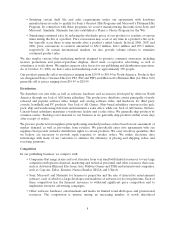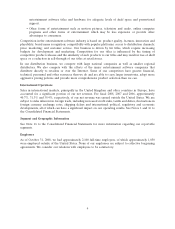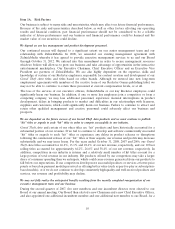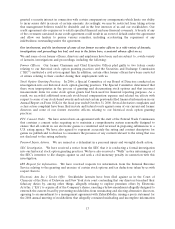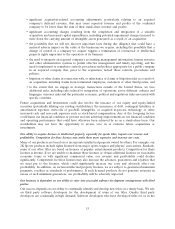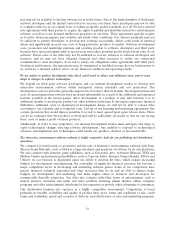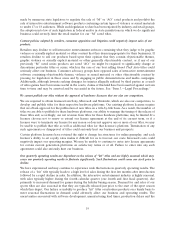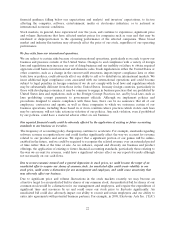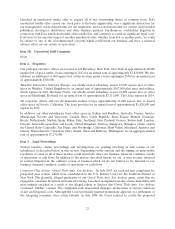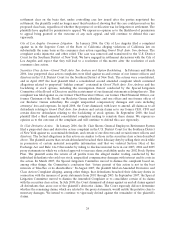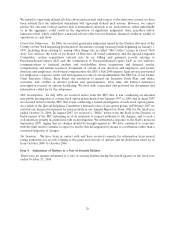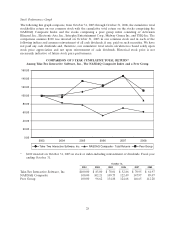2K Sports 2008 Annual Report Download - page 28
Download and view the complete annual report
Please find page 28 of the 2008 2K Sports annual report below. You can navigate through the pages in the report by either clicking on the pages listed below, or by using the keyword search tool below to find specific information within the annual report.We submit our products for rating by the Entertainment Software Rating Board (‘‘ESRB’’) in the United
States and other voluntary or government ratings organizations in foreign countries. Failure to obtain a target
rating for certain of our products could negatively impact our ability to distribute and sell those games, as
could the re-rating of a game for any reason.
We voluntarily submit our game products to the ESRB, a U.S.-based non-profit and independent ratings
organization. The ESRB system provides consumers with information about game content using a rating
symbol that generally suggests the appropriate player age group and specific content descriptors, such as
graphic violence, profanity or sexually explicit material. The ESRB may impose significant penalties on
game publishers for violations of its rules related to rating or marketing games, including revocation of a
rating or monetary fines up to $1 million. Other countries require voluntary or government backed ratings
as prerequisites for product sales in those countries. We believe that we comply with rating system
requirements and properly display the designated rating symbols and content descriptions. In some
instances, we may have to modify our products in order to market them under the target rating, which
could delay or disrupt the release of our products. In addition, some of our titles may not be sold at all or
without extensive edits in certain countries, such as Germany. In the United States, we develop software
titles that we intend to receive ESRB ratings of ‘‘E’’ (age 6 and older), ‘‘E10+’’ (age 10 and older), ‘‘T’’
(age 13 and older) or ‘‘M’’ (age 17 and older). In addition to these ratings, the ESRB may also rate a game
as ‘‘AO’’ (age 18 and older). Platform licensors may not certify a game rated ‘‘AO’’ and retailers may refuse
to sell ‘‘AO’’ games or games with controversial content. For instance, in 2007, some retailers reacted to the
controversy over Manhunt 2 by refusing to sell it or refusing to sell it in brick and mortar stores. In
addition, some consumers have reacted to re-ratings or controversial game content by refusing to purchase
such games, demanding refunds for games that they had already purchased, and refraining from buying
other games published by us.
We have implemented processes to comply with the requirements of the ESRB and other ratings
organizations. Nonetheless, these processes are subject to human error, circumvention, overriding and
reasonable resource constraints. If a video game we published were found to contain undisclosed pertinent
content, the ESRB could re-rate a game, retailers could refuse to sell it and demand that we accept the
return of any unsold copies or returns from customers, and consumers could refuse to buy it or demand
that we refund their money. This could have a material negative impact on our operating results and
financial condition. In addition, we may be exposed to litigation, administrative fines and penalties and our
reputation could be harmed, which could impact sales of other video games we sell. If any of these
consequences were to occur, our business and financial performance could be significantly harmed.
Many of our Rockstar titles and certain of our 2K Games titles have been rated ‘‘M’’ by the ESRB. If we
are unable to obtain ‘‘M’’ ratings and instead receive ‘‘AO’’ ratings on future versions of those or similar
titles as a result of changes in the ESRB’s ratings standards or for other reasons, including the adoption of
legislation in this area, our business and prospects could be negatively affected. If any of our games are
re-rated by the ESRB or other foreign based ratings organizations, we could be exposed to litigation,
administrative fines and penalties and other potential liabilities, and our operating results and financial
condition could be significantly impacted.
Our business and products are subject to potential legislation. The adoption of such proposed legislation could
limit the retail market for our products.
Several proposals have been made for federal legislation to regulate our industry. Such proposals seek to
prohibit the sale of ‘‘M’’ rated, ‘‘AO’’ rated and ‘‘Rating Pending’’ products to under-17 audiences (while
the ESRB rating recommends an appropriate age group, there is currently no legal prohibition on any
game sales). If any such proposals are enacted into law, it may limit the potential market for our ‘‘M’’ rated
products in the United States, and adversely affect our operating results. Other countries, such as
Germany, have adopted laws regulating content both in packaged games and those transmitted over the
Internet that are stricter than current United States laws. In the United States, proposals have also been
18


